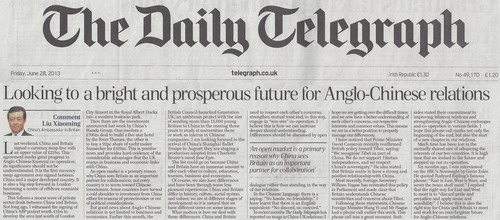|

LAST weekend China and Britain signed a currency swap line with an upper value of £21 billion. This agreement marks great progress in Anglo-Chinese financial cooperation; its significance should not be underestimated. It is the first currency swap agreement ever signed between China and a major developed country. It is also a big step forward in London becoming a centre of offshore RMB business.
This follows a recent wave of private sector deals between China and Britain. Not long ago I witnessed the signing of China’s ABP project worth £1 billion to develop the area just south of London City Airport in the Royal Albert Docks into a modern business park.
Then there are the investments announced last week by China’s Wanda Group. One involves a £700 million deal to build a five-star hotel by the River Thames; the other is to buy a 92% share of yacht maker Sunseeker for £320 million. This is positive news and provides hard evidence of the considerable advantages that the UK enjoys in business and economic links with China.
An open market is a primary reason why China sees Britain as an important partner for collaboration; not every country is so warm toward Chinese investments. Some countries have turned a cold shoulder to investment from China either for reasons of protectionism or out of political considerations.
But good news about Anglo-Chinese relations is not limited to business and economics. Earlier this month, the British Council launched Generation UK, an ambitious project with the aim of sending more than 15,000 young Britons to China in the coming three years to study at universities there or work as interns in Chinese companies. I am looking forward to the arrival of China’s Shanghai Ballet Troupe in August; they are staging a production adapted from Charlotte Bronte’s novel Jane Eyre.
The list could go on because China and Britain have an immense amount to offer each other in culture, education, tourism, business and economics.
Of course, we also have differences and have been through some less pleasant experiences. China and Britain differ in history, culture, social system and values; we are at different stages of development so it is natural that we have different views on some issues.
What matters is how we deal with these differences. China and Britain need to respect each other’s concerns, strengthen mutual trust and, in this way, engage in ‘win-win’ cooperation. I believe this is how we can increase deeper shared understanding. Differences should be discussed by open dialogue rather than standing in the way of our relations.
In the Chinese language there is a saying: ‘No hassle, no friendship.’ I have learned that there is an English equivalent: ‘No discord, no concord.’ In recent months The Daily Telegraph has reported on snags in China-UK relations; I hope we are getting over the difficult times and we now have a better understanding of each other’s concerns, our respective interests and common values. This means we are in a better position to properly manage our differences.
I have noticed that Prime Minister David Cameron recently reaffirmed British policy toward Tibet, saying: “We recognise Tibet as part of China. We do not support Tibetan independence, and we respect China’s sovereignty” He also stated that Britain wants to have a strong and positive relationship with China.
Most recently, Foreign Secretary William Hague has reiterated this policy in Parliament and made clear that Britain understands Chinese sensitivities and concerns about Tibet.
Following these statements, Chinese Foreign Minister Wang Yi and Mr Hague had a phone call earlier this week. This phone call was a great moment. Both sides stated their commitment to improving bilateral relations and strengthening Anglo-Chinese exchanges and cooperation in various fields. I hope this phone call marks not only the beginning of the end, but also the start of a new chapter in our relations.
Much time has been lost in the mutually shared aim of advancing the interests of our two countries. It is high time that we looked to the future and stepped up our cooperation.
Six months ago, I was interviewed on BBC Newsnight by Gavin Esler. He quoted Rudyard Kipling’s famous phrase: ‘East is East, West is West, and never the twain shall meet.’ I replied that the right way for East and West to meet is to ‘discard pride and prejudice and apply sense and sensibility.’ I believe this is also the right way for China and Britain to meet and work for an even brighter future for Anglo-Chinese relations.
Liu Xiaoming is China’s Ambassador in Britain
|

